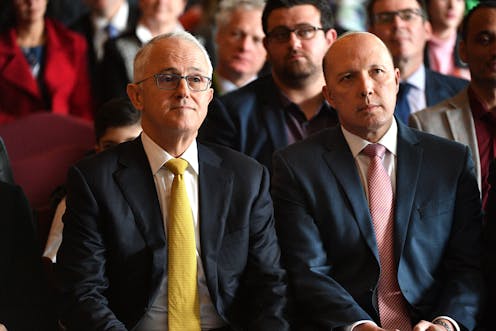New data access bill shows we need to get serious about privacy with independent oversight of the law
- Written by Greg Austin, Professor UNSW Canberra Cyber, UNSW

The federal government today announced its proposed legislation to give law enforcement agencies yet more avenues to reach into our private lives through access to our personal communications and data. This never-ending story of parliamentary bills defies logic, and is not offering the necessary oversight and protections.
The trend has been led by Prime Minister Malcolm Turnbull, with help from an ever-growing number of security ministers and senior officials. Could it be that the proliferation of government security roles is a self-perpetuating industry leading to ever more government powers for privacy encroachment?
That definitely appears to be the case.
Striking the right balance between data access and privacy is a tricky problem, but the government’s current approach is doing little to solve it. We need better oversight of law enforcement access to our data to ensure it complies with privacy principles and actually results in convictions. That might require setting up an independent judicial review mechanism to report outcomes on an annual basis.
Read more: Australia should strengthen its privacy laws and remove exemptions for politicians
Where is the accountability?
The succession of data access legislation in the Australian parliament is fast becoming a Mad Hatter’s tea party – a characterisation justified by the increasingly unproductive public conversations between the government on one hand, and legal specialists and rights advocates on the other.
If the government says it needs new laws to tackle “terrorism and paedophilia”, then the rule seems to be that other side will be criticised for bringing up “privacy protection”. The federal opposition has surrendered any meaningful resistance to this parade of legislation.
Rights advocates have been backed into a corner by being forced to repeat their concerns over each new piece of legislation while neither they nor the government, nor our Privacy Commissioner, and all the other “commissioners”, are called to account on fundamental matters of principle.
Speaking of the commissioner class, Australia just got a new one last week: the Data Commissioner. Strangely, the impetus for this appointment came from the Productivity Commission.
The post has three purposes:
- to promote greater use of data,
- to drive economic benefits and innovation from greater use of data, and
- to build trust with the Australian community about the government’s use of data.
The problem with this logic is that purposes one and two can only be distinguished by the seemingly catch-all character of the first: that if data exists it must be used.
Leaving aside that minor point, the notion that the government needs to build trust with the Australian community on data policy speaks for itself.
National Privacy Principles fall short
There is near universal agreement that the government is managing this issue badly, from the census data management issue to the “My Health Record” debacle. The growing commissioner class has not been much help.
Australia does have personal data protection principles, you may be surprised to learn. They are called “Privacy Principles”. You may be even more surprised to learn that the rights offered in these principles exist only up to the point where any enforcement arm of government wants the data.
So it seems that Australians have to rely on the leadership of the Productivity Commission (for economic policy) to guarantee our rights in cyber space, at least when it comes to our personal data.
Better oversight is required
There is another approach to reconciling citizens’ interests in privacy protection with legitimate and important enforcement needs against terrorists and paedophiles: that is judicial review.
The government argues, unconvincingly according to police sources, that this process adequately protects citizens by requiring law enforcement to obtain court-ordered warrants to access information. The record in some other countries suggests otherwise, with judges almost always waving through any application from enforcement authorities, according to official US data.
There is a second level of judicial review open to the government. This is to set up an independent judicial review mechanism that is obliged to annually review all instances of government access to personal data under warrant, and to report on the virtues or shortcomings of that access against enforcement outcomes and privacy principles.
There are two essential features of this proposal. First, the reviewing officer is a judge and not a public servant (the “commissioner class”). Second, the scope of the function is review of the daily operation of the intrusive laws, not just the post-facto examination of notorious cases of data breaches.
It would take a lengthy academic volume to make the case for judicial review of this kind. But it can be defended simply on economic grounds: such a review process would shine light on the efficiency of police investigations.
According to data released by the UK government, the overwhelming share of arrests for terrorist offences in the UK (many based on court-approved warrants for access to private data) do not result in convictions. There were 37 convictions out of 441 arrests for terrorist-related offences in the 12 months up to March 2018.
Read more: Explainer: what is differential privacy and how can it protect your data?
The Turnbull government deserves credit for its recognition of the values of legal review. Its continuing commitment to posts such as the National Security Legislation Monitor – and the appointment of a high-profile barrister to such a post – is evidence of that.
But somewhere along the way, the administration of data privacy is falling foul of a growing bureaucratic mess.
The only way to bring order to the chaos is through robust accountability; and the only people with the authority or legitimacy in our political system to do that are probably judges who are independent of the government.
Authors: Greg Austin, Professor UNSW Canberra Cyber, UNSW



















